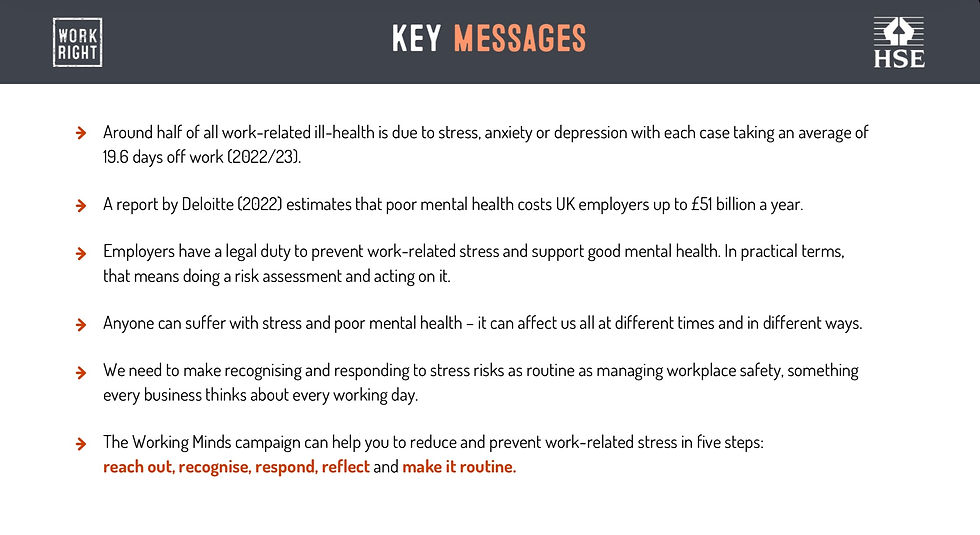Stress Awareness Week 2025: Managing Stress to Protect Quality, Compliance & KPIs
- Ecosafe

- Nov 5, 2025
- 3 min read
Updated: Feb 19

Workplace stress affects delivery. UK law requires employers to manage that risk.
In construction, commercial properties, and social housing contracts, stress doesn’t show up in conversations; it shows up in the work:
Rushed quality
Missed details
Callbacks
Dissatisfied residents
Residents often notice a drop in quality long before management does.
And when stress impacts quality, it becomes a performance and compliance issue, not a wellbeing conversation.
When Stress Impacts Work, It Impacts Compliance
Teams working across the UK, particularly those supporting housing associations, property owners, and building managers, deal with:
Tight turnaround times
Changing access appointments
Pressure from resident expectations
Last minute reactive jobs added to the schedule
When those pressures build, stress becomes visible on site. Resulting in:
Corners are cut
Avoidable mistakes occur
Repeat visits increase cost
Under UK legislation, employers must intervene before stress causes harm, either to people or to project outcomes.
Employer Responsibilities: What the law actually requires
UK health & safety law requires employers to:
Assess risks that could cause harm (including stress)
Take action to reduce those risks
Monitor whether controls are working
These requirements apply whether you’re managing:
A void turnaround
A bathroom renovation
A planned maintenance programme
Or commercial reactive repairs
HSE classifies stress as a workplace risk. Employers must manage that risk in the same way they manage physical safety hazards. Just like working at height, fire stopping, or with asbestos.
If stress is affecting work, quality, or resident satisfaction, that’s a risk.
Why quality drops matter to property and housing associations
Here’s the domino effect we see in housing & property management:
Operative under pressure
Rushed work
Resident unhappy
Complaint logged
MORE pressure, MORE stress
These complaints travel fast, into:
KPI reports
Procurement frameworks
Contract performance reviews
Resident satisfaction completes the job, not the final coat of paint.
The Working Minds Approach (The 5 R’s)
HSE’s campaign breaks stress management into five simple steps:
Reach out - start conversations early
Recognise - notice signs like burnout, rushing, silence
Respond - adjust workload or deadlines
Reflect - check if stress has reduced
Routine - build wellbeing into daily management
Wellbeing is vital to us at Ecosafe. We look after our people because it’s the right thing to do, and strong delivery follows naturally. When teams feel supported, they produce their best work, residents have a better experience, and projects run smoothly. People first. Quality follows.
When someone reaches out early, quality improves, on site and at home.
Support available for workers
If someone is experiencing stress at work, the most crucial step is to talk to someone early, such as their manager, HR representative, mental health first aider, or GP. Early conversation allows the employer to make adjustments and prevent pressure from building.
Signs someone may be struggling can include:
Difficulty concentrating
Withdrawing from conversation
Changes in eating or sleeping habits
Relying on alcohol, smoking or substances to cope
Stress isn’t weakness; it’s a response to prolonged pressure.
Support exists, and no one should feel the need to manage it alone.
For more support, visit the HSE’s guidance for workers
For mental health advice, visit NHS: Every Mind Matters
Stress Prevention Checklist for Managers (10 minutes or less)
Five actions that reduce stress AND improve outcomes:
Add stress awareness to your next toolbox talk
Ask one person: “How are you coping?”
Review workload - who is overloaded?
Use HSE’s Talking Toolkit in your next 1:1
Small actions = fewer mistakes and fewer callbacks.
Why This Matters to Property Leadership
Workplace stress affects:
Job quality
Morale and retention
Resident satisfaction scores
Contract performance KPIs
When stress levels rise, residents notice it in their work.
The fastest way to reduce stress is to minimise operational pressure.
Ecosafe Group: Here to Reduce That Pressure
When internal teams are overextended, stress levels rise.
When stress increases, quality drops.
When quality drops, residents complain.
Ecosafe removes that burden by taking full responsibility for:
Reactive repairs & maintenance
Void property refurbishment
Multi-trade project delivery
We operate across the UK, the South West, London and Sussex, supporting:
Housing associations
Property managers
Commercial clients
If stress is affecting results, we can take the workload off your team.
Book a consultation to reduce operational pressure: Ecosafe Group Building Services.
Frequently Asked Questions
What is the Working Minds campaign?
HSE’s campaign that helps employers manage stress through the 5 Rs: Reach Out, Recognise, Respond, Reflect, Routine.
How do I know stress is affecting our delivery?
When quality drops, complaints increase, or deadlines slip - stress is in the background.
Do employers have a legal responsibility to manage stress?
Yes. Stress is a risk and must be under control like any other safety hazard.
Final thought: Stress affects quality. Quality affects compliance.
Residents see it first.
Address stress before it becomes a problem.
Safe homes start with safe people.
.png)






Comments